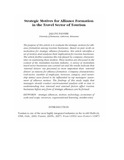Please use this identifier to cite or link to this item:
http://hdl.handle.net/10311/848| Title: | Strategic motives for alliance in the travel sector of tourism |
| Authors: | Pansiri, J. |
| Keywords: | strategic alliances Motives Technology market entry resources economies of scale and scope organizational learning |
| Issue Date: | 2009 |
| Publisher: | Routledge, www.routledge.com |
| Citation: | Pansiri, J. (2009) Strategic motives for alliance in the travel sector of tourism, International Journal of Hospitality and Tourism Administration, Vol. 10, pp. 143-173 |
| Abstract: | The purpose of this article is to evaluate the strategic motives for alliance formation among tourism businesses. Based on past work on motivation for strategic alliance formation, this article identifies a set of motives and analyzes their implication for tourism businesses. The article further examines the role played by company characteristics in examining these motives. The motives are discussed in the context of the Australian tourism industry. A survey of Australian Travel sector businesses was carried out and the results indicate that 'internal drivers' are perceived as more important than 'external drivers' as reasons fro alliance formation. Company characteristics (sub-sector, number of employees, turnover, category, and ownership status) were found to be influential in top managers' assessment of alliance motives. The findings of this study imply that managers should conduct environmental analysis with a view to understanding how internal and external factors affect tourism businesses before any form of strategic alliances can be formed. |
| URI: | http://hdl.handle.net/10311/848 |
| ISSN: | 1069-8043 |
| Appears in Collections: | Research articles (Dept of Management) |
Files in This Item:
| File | Description | Size | Format | |
|---|---|---|---|---|
| PanJ_IJHTA_2009.pdf | 5.65 MB | Adobe PDF |  View/Open |
Items in DSpace are protected by copyright, with all rights reserved, unless otherwise indicated.
